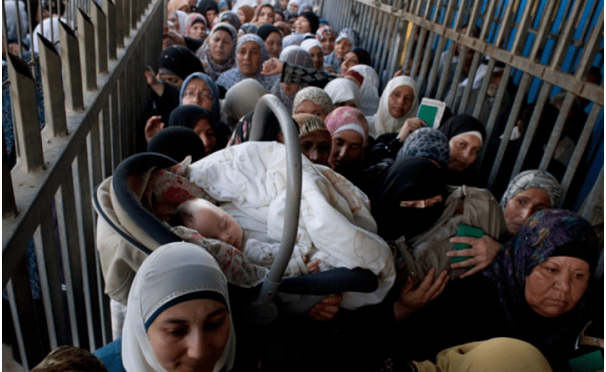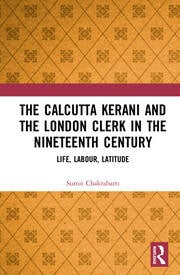Checkpoints and Tactic Agency among Palestinian Women
Posted on : February 6, 2023Author : Samragnee Chakraborty

Introduction:
In the year 1967, Israel seized the remaining parts of the territories of Palestine namely, West Bank, Jerusalem and the Egyptian Sinai Peninsula. Once occupied, the Israelis set up checkpoints in 1991 in order to monitor the movement of the Palestinians (Naaman, 2006). Checkpoints were set up in between villages and towns and the local population was required to get permits to move from one place to the other. According to Israel, the checkpoints are necessary to maintain peace, reduce the chances of terrorism and save Israeli lives (Naaman, 2006). However, the checkpoints have been spaces of surveillance that have tried to legitimize the Israeli occupation. Their affect in the lives of the Palestinians range from controlled and restricted mobility, prolonged waiting, forced detention and profound anxiety (Griffiths & Repo, 2021). They are not only sites of colonialism because of the imbalanced power structure between the subjugator and subjugated, but are also gendered spaces with women experiencing the security infrastructure differently than men. Checkpoints as a discriminatory space for women has garnered a lot of scholarly attention. Authors such as DoritNaaman, Mark Griffiths and Jemima Repo have all worked on the same field and argued that the lives of Palestinian women are severely affected and disrupted because of the checkpoints. This paper, however, takes a trajectory and lays its gaze on Palestinian women under Israeli occupation as not just passive agents, but rather as active agents who constantly make choices and decisions in order to navigate through their daily lives.
The paper argues that- even though checkpoints affect the lives of the women in Palestine, they use tactic agency and assume different roles, responsibilities and strategies in order to navigate through the gendered space. The first section focuses on the ways in which checkpoints have affected the lives of Palestinian women. And the final section highlights the strategies and tactics employed by women to navigate this gendered space. It then finally makes the conclusion that women should not necessarily be seen onlyas silent actors because this then makes them ‘unworthy’ to be studied independently.
Keywords: checkpoints, tactic agency, women, victimcy, subjugation
How do checkpoints affect the lives of Palestinian women?
Checkpoints, one of the most important characteristics of Israel’s security apparatus, has created the “most territorialized control system” (Hammami, 2019). These led to the creation of buffer zones, settlers-only area and closed military regions, all surrounded by fences and huge walls. The checkpoints were based on the idea of segregation such that lines of siege were constructed around Palestinian communities in order to prevent them from having access to the urban centres (Hammami, 2019). Moreover, most of the checkpoints are booth-like structures, occupied by the armies. This shows how spaces such as state borders, as in the study of Casaglia(Casaglia, 2020), or checkpoints in the borders of states or cities, constantly reinforce the ideas of power and domination between the subjugator and subjugated, colonizer and colonized (Hammami, 2019). Not only are these spaces racialized, but are also gendered, with women experiencing the power exercised by the patrols or armies differently. Spaces are political identities because of the way in which they result in different interactions between different groups of people.
The armies on the checkpoint have the authority to observe all the passers-by, their documents if required as well as the permits. It solely depends on them whether they allow the Palestinian civilians to move places or not. Even though restrictions are set for all the Palestinians, but the mobility of women is more controlled than men. In the article Women and Checkpoints in Palestine(Griffiths & Repo, 2021), the authors argue that the women in Palestine were denied permits most of the time. They would get permits only if they could prove the need for their travel to a different place for purposes of care and piety. For the purpose of piety, women are allowed mobility on some Fridays of the year and throughout Ramadan. Similarly for the purpose of healthcare, women are given access to permits only if they are accompanying their children, husbands or other family members. Therefore, mobility through the checkpoints is allowed only if women stand up to the normative standards of being virtuous, religious and a caring relative in the household (Griffiths & Repo, 2021). This shows how the colonial guardianship often passes bills and laws that not only take away the agency of the women in colonized countries or Global South, but also discipline womanhood and enforce or reinforce certain gender norms for them that are more focused towards the domestic sphere. For an instance, the Modern Slavery Act passed in the UK, that criminalised sex work, also restricted the agency of women to use their own bodies (Hewamanne, 2020).
The checkpoints, like state borders are a site of transgression and power (Casaglia, 2020). Since identities are always relational, the checkpoints become a space for the construction of the self and the other (Casaglia, 2020). The Israeli armies want to prove their superiority by justifying civilisational tropes. The Israeli government defend the setup of checkpoints in Palestine because according to them, they are trying to protect the Israeli citizens. This not only makes one think about the oriental idea of the other or Palestinian in this case as exotic, unknown and barbaric who are always ready to fight, but also pushes one to consider the very idea of protection itself. The idea of protection is always backed by the idea of fear (Young, 2003). In order to protect the Israelis, the state instils the feelings of stress, fear and panic among the Palestinians, and checkpoints is one of the apparatuses to ensure the same. The ways of instilling the fear may range from physical violence on the Palestinians to sexual harassment of the women willing to migrate or move.
Checkpoints and borders are also the sites of colonial fantasies, that is, “erotic locations and exotic destinations that are surveilled and supervised, patrolled and policed, regulated and restricted, but that are constantly penetrated by individuals forging sexual links with ethnic others across ethnic borders” (Casaglia, 2020).The works by authors like RemaHammami (Hammami, 2019) and Jemima Repo (Griffiths & Repo, 2021) argue that the checkpoints are also spaces for sexual harassment. Even though the exotic other, the Palestinian women in this case, are seen as racially inferior and signs of danger, but they are also desired by the Israeli armies. The armies in the checkpoints participate in the sexual harassment of the Palestinian women. While on some occasions, the armies were found flirting with young college-going women, on other occasions, they would touch the women inappropriately with the excuse of security check-in, or even ask them to open clothes and shoes when the metal detector would beep (Griffiths & Repo, 2021). Such acts are often intended to harm the dignity of the other and humiliate them. Borders are therefore, sites of individualisation where individuals get stripped out of their dignity (Casaglia, 2020). Be it the armies in Abu-Ghraib who click illicit pictures of the prisoners, or the women in the Palestinian checkpoints asked to undress themselves, the “celebration of the humiliation leads to a sort of victory and power positionover the humiliated subject” (Mackenzie, 2020)
The cases of sexual harassment at checkpoints can be looked at from many different perspectives. Firstly, this builds connections among productivity, value and labour. The dominant understanding is based on the conviction that a soldier’s productive labour is to be fulfilled through the sexual needs by the labour of someone else (Park, 2000). Soldier’s work is premised on his content or bodily pleasure either through sex or rape, be it in the case of US-Mexico’s border where migrant women have sex with the patrols (Casaglia, 2020), or the case of sexual harassment in Palestinian checkpoints. Secondly, the fact that the state does not protect everyone equally, should be considered (Young, 2003). The Israeli women who were parts of organisations like the Machsom Watch or the Checkpoint Watch did not experience sexual harassment, unlike the Palestinian women (Naaman, 2006). State machineries think in terms of who is more dispensable. Therefore, while Japan assumed the women of its colonized state Korea to be more dispensable and less worthy for protection (Park, 2000), Israeli soldiers perceive the Palestinians through the same understanding.
The Palestinian Women as Active Agents:
The checkpoints and the security infrastructure have deep-rooted impacts in the lives of the Palestinian women. However, this is just the partial side of the story. Focusing on the Palestinian women as actors who are only affected by real-world circumstances, would reduce them into actors with no choice or agency. This section of the paper highlights how the women were very much aware of the discriminatory situation that the checkpoints put them through, but navigated through them in their own ways.
Extremely destructive, but the war is a zone full of possibilities. It is a rhizomatic landscape, and there are multiple identities that do not have starting or ending points. Individuals do anything to survive in situations of war. This is the idea of creative survival, which is a strategy to navigate through social spaces (Utas, 2005). ‘Sumud’ is a term used to describe Palestinian resistance, a resistance that is rooted in the everyday life. It refers to the coping strategies that women adopt in order to navigate through the daily lives in midst of war and commotion (Richter &Devroe). This can be related to what Scott called infrapolitics, meaning a form of resistance that is in between outright revolt and complete compliance (Ryan, 2015). Sumud is a type of tactic agency, which means “certain short-term responses in relationship to a society’s social structure” (Utas, 2005).
Women tend to use a lot of tactics and strategies in order to cope under the war environment. At the checkpoints in Palestine, while women were sexually harassed in some cases, in other cases, the Palestinian women often flirted with the armies as a strategy to get their permits accepted (Naaman, 2006). This can be related to what Anna Casaglia claimed about borders having dual characteristics, one as a site of security transgression and second being a site of seduction. Just like the case of Palestinian women, the women in the Mexico-US border also take charge over themselves and negotiate their positions. They seduce the patrols and have sex with them in order to prevent deportation (Casaglia, 2020). Similarly, the women in the Liberian war zones use girlfriending as a coping strategy. By showing ‘love’ to their boyfriends, they ensure physical protection as well as economic stability (Utas, 2005), just the way the Palestinian women use seduction in order to ensure their mobility.
Secondly, the very act of telling a story is political. It gives agency to the person narrating. On being interviewed, multiple women in the studies by RemaHammami, Jemima Repo, Sophie, among a few others, narrated their day-to-day life experiences with relation to the checkpoints. Telling a story gives power to an individual to have a claim on the story as well as the experience, and power in turn produces knowledge. Story-telling is important also because one needs to prove testimony with authenticity to attain the legitimacy as someone affected or a victim. That is, the burden of story-telling and testimony lies on you. It is therefore important who you share the story with, and which story (Park, 2000).
Thirdly, even though the checkpoints are gendered spaces, but women constantly negotiate by either talking to the soldiers or running away from them. For example, in the article Destabilizing Mastery and the Machine (Hammami, 2019), one of the interviewees Naila narrates the story- The officer comes over and started talking to me and says, “Who didn’t let you pass, who stopped you? Who made you give birth?” I said, “I don’t know, you soldiers didn’t let me pass, how would I know which one?” (Hammami, 2019, p.93) Whereas in the case of Nora, she narrates- “And he tells me that I should respect him, so I said how can I respect you and you’re making me angry? So, he told me to wait on the side. I ignored him and kept walking. I was terrified but I kept walking. It’s like that— he just wants to flirt, what’s your name? What’s your phone number?” (Hammami, 2019, p.93). The very act of replying back or ignoring the armies knowing the fact that their permits could were under their control, portrays how women use tactic agency or Sumud in their everyday lives. These also challenge the binaries between the subjugated and subjugators.
Apart from using Sumud, women also engaged in outright revolt in the form of suicide bombing to exercise their agency in checkpoints. Palestinian women have focussed on the segregated racialisedspaces, that created power, hierarchy and control on part of the colonizers. like special roads, urban spaces and refugee camps. For an instance, the bomb blast by Abu ‘Aisheh took place when she was asked to show her documents in the checkpoint between West Bank and Maccabim. Such an exercise of agency not only goes against the racialized practices but also against the gender norms. The checkpoints that controlled the movement of women so extensively, was bombed by a woman herself. The checkpoint permit tried to restrict women to the households and enforced their identities only as related to care and piety. But through an act like suicide-bombing, women blur the binaries as they participate in protecting their community and nation, an act traditionally associated with men (Hasso, 2005).
Conclusion:
The paper focussed on the checkpoints of Palestine, that control the movements of all the Palestinians. These spaces are however gendered because they experience greater and stricter control on movements along with sexual harassment and discriminatory laws. The paper argues that looking at women only being affected by such circumstances and politics leads to a reductionist understanding. Women in Palestine use tactic agency and a variety of other coping strategies to navigate through their daily lives. Some of the strategies include narrating stories, engaging with soldiers, flirting with them and even bombing checkpoints.
REFERENCES:
Casaglia, A. (2022). Pornography at the border: ethnosexualborderscapes, gendered violence, and embodied control. Geopolitics, 27(1), 185-205.
Griffiths, M., & Repo, J. (2021).Women and checkpoints in Palestine.Security dialogue, 52(3), 249-265.
Hammami, R. (2019). Destabilizing mastery and the machine: Palestinian agency and gendered embodiment at Israeli military checkpoints.Current Anthropology, 60(S19), S87-S97.
Hasso, F. S. (2005). Discursive and political deployments by/of the 2002 Palestinian women suicide bombers/martyrs.feminist review, 81(1), 23-51.
Hewamanne, S. (2020). Surveillance by another name: The Modern Slavery Act, global factory workers, and part-time sex work in Sri Lanka. Signs: Journal of Women in Culture and Society, 45(3), 653-677.
MacKenzie, M. (2020). Why do soldiers swap illicit pictures? How a visual discourse analysis illuminates military band of brother culture. Security dialogue, 51(4), 340-357.
Naaman, D. (2006). The silenced outcry: A feminist perspective from the Israeli checkpoints in Palestine. NWSA Journal, 18(3), 168-180.
Park, Y. M. (2000). Comforting the nation: ‘Comfort women,’ the politics of apology and the workings of gender.interventions, 2(2), 199-211.
Richter-Devroe, S. (2011). Palestinian women’s everyday resistance: Between normality and normalisation.
Ryan, C. (2015). Everyday resilience as resistance: Palestinian women practicing sumud. International Political Sociology, 9(4), 299-315.
Utas, M. Victimcy, Girlfriending, Soldiering: Tactic Agency in a Young Woman’s Social Navigation of the Liberian War Zone’(2005) 78. Anthropological Quarterly, 403.
Young, I. M. (2003). The logic of masculinist protection: Reflections on the current security state. Signs: journal of women in culture and society, 29(1), 1-25.
Author- SamragneeChakraborty,
Intern, AGA





Leave a Reply